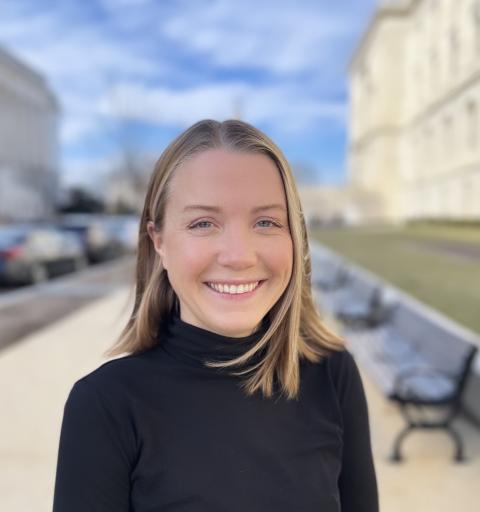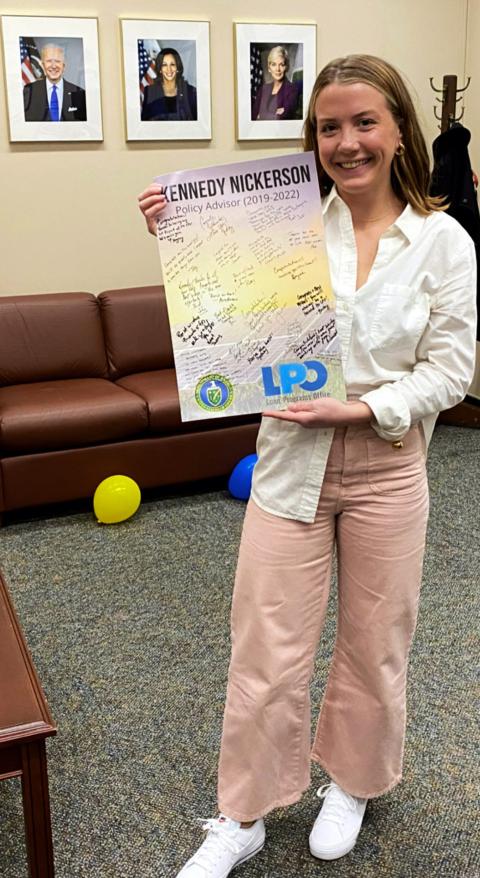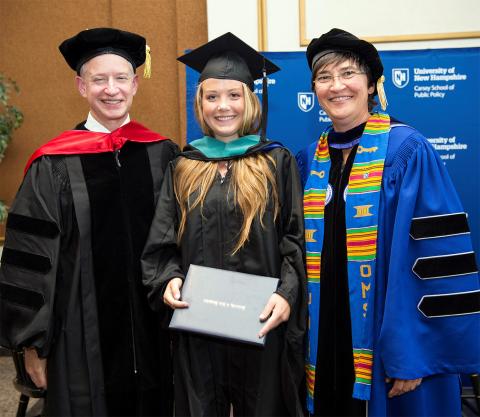
Current position: Manager, Boundary Stone Partners
Previous position(s): Policy Advisor, Department of Energy (DOE) Loan Programs Office; Senior Fiscal Policy Analyst, Massachusetts Senate Committee on Ways and Means
Carsey Degree: Master in Public Policy (MPP)
UNH Undergraduate Degree: Bachelor of Arts in Psychology
While at UNH:
- Research Fellow with the Vulnerable Families Research Program at Carsey
"I’ve always been passionate about combatting inequality. While you may not intuitively see the connection, energy costs and climate change both severely exacerbate inequality by disproportionately impacting women and people of color. By helping private companies deploy more clean energy technologies at scale for less, I feel that I’m having some impact in mitigating inequality and that makes it easy to go to work every day."
What were some of your responsibilities with the Department of Energy?
My work and responsibilities during my time at the DOE varied. Thanks to my prior experience as a Senior Fiscal Policy Analyst for the Massachusetts State Senate, I started out on the budget team in the Department’s Loan Programs Office. In that role, I analyzed federal appropriations bills and created budget requests for LPO’s three energy loan programs. Thanks to my MPP, I got pulled into doing some business development, stakeholder engagement, and legislative affairs work. For example, after the passage of the Infrastructure Investment and Jobs Act (IIJA) of 2021, I helped lead LPO’s implementation efforts across the Department, including standing up the newly established Office of Clean Energy Demonstrations. I also gained experience in speechwriting and social media.

What drew you to working in the energy policy field?
While I hadn’t had much experience in energy policy before starting at DOE, I’ve always been concerned about climate change and have understood the importance of bold federal policies in mitigating its impact. Once I got to the DOE and began learning about the clean energy technologies that were available or in development, I became really interested in understanding the role that public policy plays (or should play) in enabling private markets to deploy those technologies at a scale that has real climate impact. I translated that interest into several internal white papers on the specific policy levers the U.S. needs to utilize to remove the regulatory or market barriers to commercial scale deployment of several technologies.
What do you enjoy most about this work and why?
I’ve always been passionate about combatting inequality. As a UNH undergraduate, I worked in the Interpersonal Violence Research Lab and in grad school I was a research fellow in the Vulnerable Families Research Lab at the Carsey School, both of which studied various causes and side effects of inequality. While you may not intuitively see the connection, energy costs and climate change both severely exacerbate inequality by disproportionately impacting women and people of color. By helping private companies deploy more clean energy technologies at scale for less, I feel that I’m having some impact in mitigating inequality and that makes it easy to go to work every day.
Why did you choose the MPP program at Carsey and what aspects did you enjoy most about the program and why?
I chose the MPP program at Carsey thanks to one of my favorite Psychology professors at UNH – Dr. Katie Edwards. I had originally thought that I wanted to be a counselor of some sort, but after working in Dr. Edwards’ Interpersonal Violence Research Lab I realized that I wanted to focus more on prevention. Dr. Edwards suggested public policy, and luckily UNH was launching the MPP program that year! I jumped at the opportunity and started almost immediately since I only had a couple of classes left to take in the Spring semester to meet my undergraduate requirements. I really enjoyed that flexibility in the program. I also enjoyed the Washington, D.C., Colloquium, which solidified my goal to find work there because of how beautiful the city is and how great the people were that Carsey School Director Michael Ettlinger introduced us to.

What's one or two important lessons from the MPP program that you continue to use daily in your work?
The writing advice I gained in the program has been extremely valuable. Michael Ettlinger was adamant about how important clear, concise writing is in public policy. In my day to day at DOE, I was constantly writing – writing speeches, writing memos, writing policy white papers. I am really grateful that I had that specific policy writing guidance during my MPP program. I also think back to my policy analysis courses and I've been able to pull a lot of those skills into my role in implementing IIJA provisions.
What are some nonprofits you’ve been involved in and are currently involved in?
I have done some volunteering in New Hampshire, Boston and DC. While earning my MPP in NH, I was asked by classmate Tracy Hardekopf to join the board of directors for a women and children’s homeless shelter in Greenland, NH, called New Generation. When I moved to Boston, I volunteered at homeless shelters, regularly cooking and serving food for the homeless and sorting donations. Then, when I moved to DC, I began volunteering at Habitat for Humanity and joined ScholarCHIPS as a mentor for college students who grew up with at least one parent in the prison system. It’s extremely important to me to be able to give back to my community in some way.
How long have you lived in Washington, D.C., and what do you enjoy about living and working in the area?
I’ve been in DC for 3 years! I love the early Spring – especially the cherry blossoms – the architecture, and the people here.
About Kennedy Nickerson: Kennedy is a Manager at Boundary Stone Partners, the leading climate change government affairs firm working at the intersection of technology, finance, and policy. Prior to joining Boundary Stone Partners, she worked as a Policy Advisor in the U.S. Department of Energy’s Loan Programs Office, which provides debt financing for the commercial deployment of large-scale energy projects. While at LPO, Kennedy helped the Department implement a record-breaking amount of funding for DOE clean energy, building energy efficiency, grid upgrades, and climate resilience programs from the Infrastructure Investment and Jobs Act of 2021, and worked directly with industry to understand how we can make existing policy work harder for the clean energy transition.
In her free time, Kennedy runs with Northeast Track Club and volunteers to give back to her D.C. community.